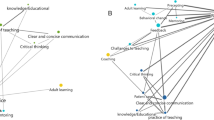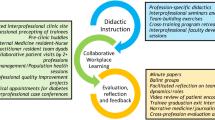Abstract
BACKGROUND
The Chronic Care Model (CCM) is a multidimensional framework designed to improve care for patients with chronic health conditions. The model strives for productive interactions between informed, activated patients and proactive practice teams, resulting in better clinical outcomes and greater satisfaction. While measures for improving care may be clear, measures of residents’ competency to provide chronic care do not exist. This report describes the process used to develop educational measures and results from CCM settings that used them to monitor curricular innovations.
SUBJECTS
Twenty-six academic health care teams participating in the national and California Academic Chronic Care Collaboratives.
METHOD
Using successive discussion groups and surveys, participants engaged in an iterative process to identify desirable and feasible educational measures for curricula that addressed educational objectives linked to the CCM. The measures were designed to facilitate residency programs’ abilities to address new accreditation requirements and tested with teams actively engaged in redesigning educational programs.
ANALYSIS
Field notes from each discussion and lists from work groups were synthesized using the CCM framework. Descriptive statistics were used to report survey results and measurement performance.
RESULTS
Work groups generated educational objectives and 17 associated measurements. Seventeen (65%) teams provided feasibility and desirability ratings for the 17 measures. Two process measures were selected for use by all teams. Teams reported variable success using the measures. Several teams reported use of additional measures, suggesting more extensive curricular change.
CONCLUSION
Using an iterative process in collaboration with program participants, we successfully defined a set of feasible and desirable education measures for academic health care teams using the CCM. These were used variably to measure the results of curricular changes, while simultaneously addressing requirements for residency accreditation.


Similar content being viewed by others

References
Bodenheimer T, Chen E, Bennett H. Confronting the growing burden of chronic disease: can the US health care workforce do the job? Health Affairs. 2009;28:64–74.
Institute of Medicine. Crossing the quality chasm: a new health system for the twenty-first century. Washington: National Academy Press; 2001.
Bodenheimer T, Wagner EH, Grumbach K. Improving primary care for patients with chronic illness. JAMA. 2002;288:1775–9.
Bodenheimer T, Wagner EH, Grumbach K. Improving primary care for patients with chronic illness: the chronic care model, part 2. JAMA. 2002;288:1909–14.
Warm EJ, Schauer DP, Diers T, et al. The ambulatory long-block: An Accreditation Council for Graduate Medical Education (ACGME) Educational Innovations Project (EIP). J Gen Intern Med. 2008;23:921–6.
Dipiero A, Dorr DA, Kelso C, Bowen JL. Integrating systematic chronic care for diabetes into an academic general internal medicine resident-faculty practice. J Gen Intern Med. 2008;23:1749–56.
Wagner EH, Austin BT, Davis C, Hindmarsh M, Schaefer J, Bonomi A. Improving chronic illness care: translating evidence into action. Health Affairs. 2001;20:64–78.
ACGME Outcome Project. Available at: http://www.acgme.org/outcome/comp/compMin.asp, accessed March 23, 2010.
Langley GL, Nolan KM, Nolan TW, Norman CL, Provost LP. The improvement guide: a practical approach to enhancing organizational performance. 2nd ed. San Francisco: Jossey-Bass Publishers; 2009.
Bonomi AE, Wagner EH, Glasgow RE, Von Korff M. Assessment of Chronic Illness Care (ACIC): a practical tool to measure quality improvement. Health Serv Res. 2002;37:791–820.
Lorig KR, Ritter P, Stewart AL, et al. Chronic disease self-management program: two-year health status and health care utilization outcomes. Med Care. 2001;39:1217–23.
Norcini JJ, Blank LL, Duffy FD, Fortna GS. The mini-CEX: a method for assessing clinical skills. Ann Int Med. 2003;138:476–81.
Acknowledgement
The Robert Wood Johnson Foundation and the California Healthcare Foundation generously supported the academic chronic care collaboratives that served as the basis for this work
Conflict of interest
None disclosed.
Author information
Authors and Affiliations
Corresponding author
Electronic supplementary material
Below is the link to the electronic supplementary material.
ESM 1
(DOC 32 kb)
Rights and permissions
About this article
Cite this article
Bowen, J.L., Stevens, D.P., Sixta, C.S. et al. Developing Measures of Educational Change for Academic Health Care Teams Implementing the Chronic Care Model in Teaching Practices. J GEN INTERN MED 25 (Suppl 4), 586–592 (2010). https://doi.org/10.1007/s11606-010-1358-1
Published:
Issue Date:
DOI: https://doi.org/10.1007/s11606-010-1358-1



